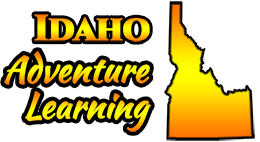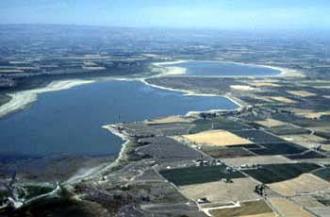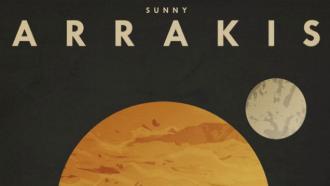Take-Out Lessons (with a side of fries)
Submitted by Justin Hand on Fri, 2016-07-15 00:00
Today's assignment, which I suppose I will choose to accept, go as follows:
1. What are you taking away from today?
2. What activity or information are you most likely to use in your classes?
Today was pretty awesome. I suppose you should hear a little bit about it for my answers to those questions to make a tater tot's (or gem's... Or coin's... Or waffle fry's) worth of sense. First, we headed out to the Deer Flat Wildlife Refuge for a discussion about usage and conservation of Lake Lowell, as well as a tour of the visitor's center. The visitor's center was pretty sweet, featuring some delightfully stuffed local birds and critters. It was a little disappointing to see that such a valuable place as this had many, many fewer stuffed animals and display pieces than, say, I don't know, Cabela's. That's Capitalism, love it or not. One of the most interesting things we learned, although not the most suprising, was the public's reaction to conservation measures (shutting down Lake Lowell to people using motor boats for water skiing or anything like that). There was quite a bit of outcry, including songs of protest played from the back of a pick-up truck with two gigantic 'Murican flags flying above the singer. I'm pretty sure he was sitting on a coffin that symbolized the death of Lake Lowell. Pretty dramatic considering the end result was that people can still use motor boats on sections of the lake (with the exception of some protected, no-wake zones... Which anglers can still utilize), while the rest of the lake is open to people for use fishing, bird watching, hiking, swimming, etc. One of our intrepid guides pointed out that it's fairly ridiculous for folks to complain when their use of the lake is free AND the primary purpose of the lake is as a water storage site for irrigation to farms in Caldwell and the surrounding area... Not motor boat city.
Okay, I spent too much time on that portion of the day. We also took an extremely cool and educational tour throughout Simplot's potato processing facility, where we saw a potato's journey from arrival at the facility, to cleaning and sorting, to even slicing, cooking and frying (we'll call it a Psuedo-Fry, the name of my next New Wave / Christian Rap-Metal band). It was an amazing place with much more going into it than anyone thinks. For example, the unattractive (yet totally edible) portions of each potato are cut out and used as hash browns, tater tots, tater gems, etc. Also, they recycle a gargantuan amount of water and clean it to the point of being potable, but don't actually use it for drinking (it's used in all of those processes described above). ANy potato waste, of which there is a considerable amount, becomes feed for livestock. The old site where livestock was raised by Simplot has turned into fields where beets and other goodies are actually grown (Simplot does not grow potatoes... I'm pretty sure we learned that).
Time to answer the durn questions already:
1. Water is very protected. I don't mean that in a bad way at all. Companies like Simplot (and Roaring Springs, as I was informed) treat and recycle so much of their own water. That has to please consumers, right? And, despite ridiculous public outcry, places like Lake Lowell and the creatures that call that place home, are fairly protected (don't hate the local park operators; it was mandated by the Feds, people). This is a good thing. Not only is our water protected, those aforementioned fishies and birdies are, too, and that makes my heart smile. As I discussed with Carly in a previous post, I believe that all stakeholders are really doing a pretty decent job of playing nicely together for the benefit of all.
2. This is harder to answer. What will I take to the classroom? Due to our school's interesting schedule, I'm not sure how much scaffolding and front-loading I'll be able to dedicate time to in order to delve too deeply into things. Certainly, I'd like my students thinking (and writing) about their relationship to local water, especially after they take the time to learn about the NY Canal, the Columbia, Snake and Boise River, the stakeholders who utilize it and the benefits all of us, including our local flora and fauna, and any other fun peripheral aspects of water. I could certainly see an argumentative essay or speech taking a stance on conservation vs. unbridled usage of our watershed. I'd also like students to do the activity where you simulate a watershed by crumpling paper, drawing along the rideglines with felt pens, and then misted with water until the blue bled and showed you where water would run off.
Finally, and I have to say it, after seeing, hearing, listening to and discussing so much beautifully clear water, I'm ready for a cool glass and a dunk in the river. I'm so grateful that my locality, my state, my country isn't a harsh, desert environment like the planet Arrakis. Even more so, I'm glad I don't have to ramble along in some shuffle-step-shuffle pattern, trying to not have my steps attract a sandworm as the sound bangs off of the hard pan beneath surface sands. And, even as I write what is intended to be something humorous and a reference to one of my favorite books of all time, I can't help but feel a metaphor coming on. Maybe our footsteps, be they in regular rhythm (not good for maker avoidance) or in some purposefully irregular pattern, represents our impact on our environment and on our local water source. Maybe the rhythm of this walk equates to overuse or careless utilization of our beloved Boise River and even the world's potable water. Maybe the worm we are trying to not attract is the wrath of nature when we abuse it. Maybe the worm is what happens when we deplete our water or render it unusable. Maybe the worm is that thing inside us, that thing that makes us human in the bad way, that monster that devours without thought for consequence, or the beast that we know will emerge when it comes to battling over the last usable water on the planet. That's an end that none of us want.
"Walk without rhythm and we won't attract the worm."
-Fremen Proverb*
*No, it's not, I actually think it's dialogue between Paul and Jessica, but "Fremen Proverb" sounded way more epic. Sue me.





Comments
Water
I had no idea so many people also liked the Dune books they are a bit old. I was always a bit scared of the idea of a pure desert planet even though I live in one. I am not sure I would have survived on it. I think it does give us an idea of how lucky we are to have such a diverse planet one with many landscapes and variety. I don't think with students you always have to dedicate a ton of time. I find that integrating in a few ideas here and there often works well with standards and time constraits and such. I try to add in as much of local stuff as I can, but sometimes I do wish I could do more. I think around here all of our land managers do seem to get along for now, but how would that all go if our resources get strained? I don't know. For now I just hope that the future learns to see value in sustainability and not just growing a bigger economy.
Man vs Man, Man vs Nature
First of all, I'd like to note that I would have loved to have been there with you all this week. Thanks for sharing your insights and perspectives.
Your post made me reflect on what makes us human? What drives us to become conservationist, enviornmentalists,compassionate, greedy, etc.? Is it human nature or is it nuture? I truly believe that I have become the person I am today because a combination of my intrinsic nature and the educational styles I have been exposed to. I studied at a Jesuit university and while I was there, I was empowered to be a person of service. I was inspired to care for those around me and my environment. I believe we can only combat the man vs man or man vs nature, if we embody and educational system that educates the whole person and helps them become critical, compassionate thinkers.
As educators we hold so much power, and I think we need to embrace the opportunity to help our students to use their talents and passions for the betterment of our society. I think that one thing I am taking away from this week is that I need to fully embrace my opportunity to expose our students to real life problems and show them that they are able to pursue careers where they can solve those problems or choose to live their daily lives in a sustainable manner.
Take Aways
i liked your discussion and description of the protest that was happening about banning the motors on Lake Lowell. I love that the only reason it exists is to collect used irrigation water, but that we have made it available for other water uses, as well. My biggest take away from this class is how many different stakeholders have a view and a plan for the water in the Tresure Valley, and that basically all they can agree on is that there isn't enough water. It is such a deep, dense issue that faces us.
How to use
I saw the word writing about this topic, and that popped an idea to use this as bell ringer information and writings. I can than spread it out and fit it in at different places as we work through the year. I can use this data to work on graphing one day and open ended thoughtful writing promps that could lead to solid classroom discussions on the topic.